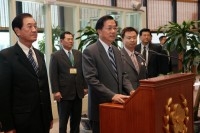
President Chen Shui-bian embarked on a Latin American trip entitled "Hand in Hand Moving Toward Co-prosperity" today and made a short speech at the Chiang Kai-Shek International Airport before boarding.
The president's speech:
The delegation and I will be making a state visit in which we aim to go hand in hand with our diplomatic allies and move toward co-prosperity. We are going to visit Guatemala, the Dominican Republic, Nicaragua, St. Christopher and Nevis, and St. Vincent and Grenadines. And we are going to attend in Nicaragua the Fifth Summit of the Heads of State and Governments of the Republic of China, Central America, and the Dominican Republic.
Purpose of this trip is three-fold:
1. Strengthening diplomatic relations with trade and economy activities
In addition to the summit with Latin American leaders in Nicaragua that is aimed at consolidating relations between Taiwan and the Central and South American states, we would also visit Guatemala and sign with the country a free trade agreement, and then we are going to sign with the government of Nicaragua another FTA. Apart from the two FTAs this year, we reached a free trade agreement with Panama last year.
As the free trade agreement between the U.S. and Latin America will soon become effective, it is urgent that Taiwan develops new diplomatic strategies and takes the initiative to tap into the changing world of international trade and businesses. The trip and the summit are the proof of this new strategy.
2. Link to the world with democracy and human rights
I will be making a transit stop in Miami thanks to the help of the U.S. government, and will be given the "human rights award" by the U.S. Congressional Human Rights Caucus. The "human rights award" is the highest respect that the U.S. Congress gives to honor people who have contributed to the promotion of the human rights. And this is not only an honor that is given to me alone, but an acknowledgment to the 23 million people of Taiwan who have pursued democracy and human rights.
Just in the past few days, some in our country have criticized the move by the U.S. Congressional Human Rights Caucus to give an award to me as inappropriate, and by saying that, they have inflicted the biggest damage to the U.S. Congress and the relations between Taiwan and the United States. The reason that the U.S. caucus gives this award is to remind the world of how Taiwan has progressed into a democracy which guarantees human rights from an authoritarian regime that ripped its people off their basic rights.
We have to cherish the human rights and freedom that we now enjoy and we have to improve with concerted efforts what is still falling short. The constitutional revision that incorporates various human rights into its protection is meaningful, and I hope honestly that everyone in this country will realize this fact and not impede this endeavor.
3. Strengthening diplomatic ties through political party reconciliation
Rivalry between political parties has been common in democracies. What the people really want in a democracy is an opposition party that is sensible and loyal to the country, an opposition party that does not object to the government for the sake of objection. And an opposition party that effectively monitors, checks and balances the government.
When we talk about diplomacy in particular, this should be the one area in politics that has the least of the controversies. In the Unites States, while the Republicans and the Democrats argue from time to time about domestic affairs, they stand united when it comes to major diplomatic issues, for example the anti-terrorist measures. Not only the two parties, but also the Congress would set aside their political lineage and cooperate with the government and stand by their people. When U.S. President George Bush and Japanese Prime Minister Junichiro Koizumi visit abroad, the oppositions would never become a force to hold the government back.
It is for this reason that I invited opposition leaders to travel with me. It has been hard to talk about many issues with various parties at home as not all of us is clear about the difficulties Taiwan has met. But if we go to the diplomatic tour together, we understand more about what is going on and more about the need to become united, especially when we face the pressure from China and yet we have to expand our room in the international society. And then we might understand the government's frustration about the lack of trust between the political parties.
It's been my pleasure to welcome Su Tseng-chang and Su Chih-chiang, chairmen of the ruling Democratic Progressive Party and the opposition Taiwan Solidarity Union, to travel with me and cement diplomatic ties with our allies. Although other opposition party leaders such as the Chinese Nationalist Party Chairman Ma Ying-jeou and the People First Party leader James Soong are unable to go, I believe that Taiwan can become "democratic progressive" as long as "they have solidarity," and only through the principle of "placing people first" can our "nationals" enjoy welfare and stability.
Let us strive for the welfare of Taiwan, my dear compatriots.